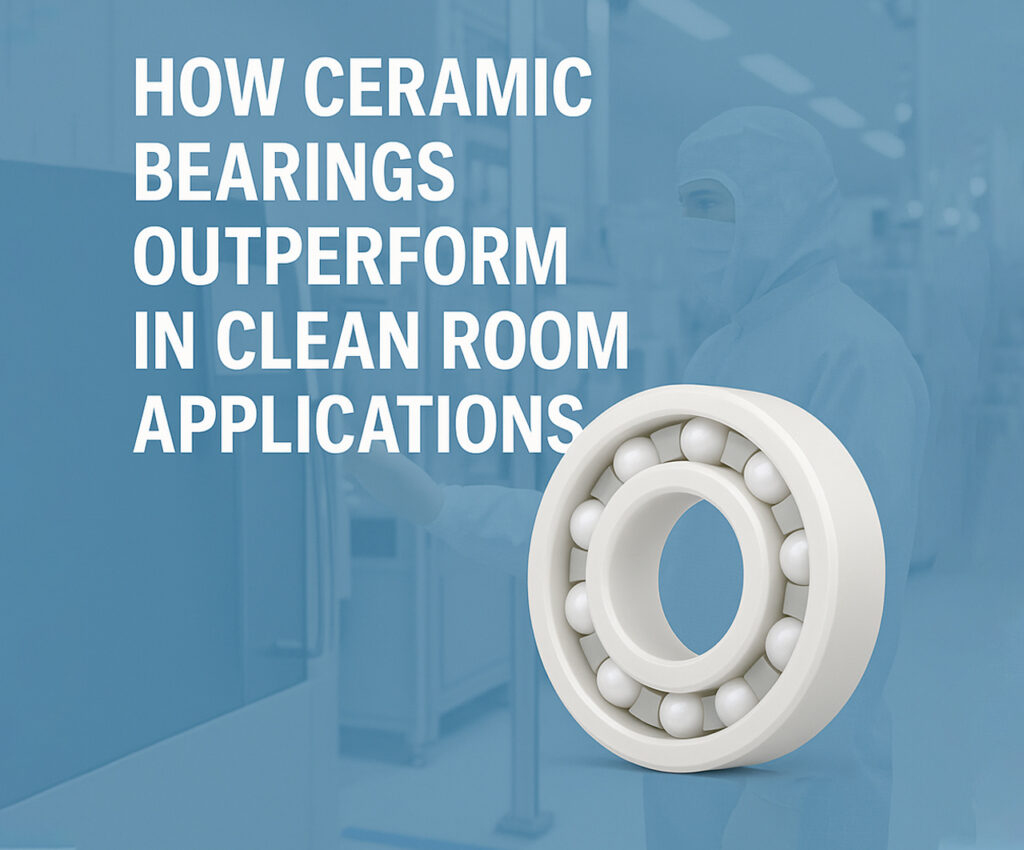In environments where contamination control is non-negotiable, ceramic cycle bearings, ceramic bearing manufacturers, and trusted ceramic ball bearing manufacturers are revolutionizing performance standards. Clean rooms, used in semiconductor fabrication, pharmaceutical production, biotechnology, and aerospace, require machinery components that can withstand demanding conditions without contributing to particle contamination or lubrication issues. Ceramic bearings rise above traditional options in these environments due to their unique material properties and high-performance capabilities. Know More
What Makes Clean Rooms Different?
Clean rooms maintain low levels of airborne particles and environmental contaminants. Even microscopic debris can ruin a product or corrupt a manufacturing cycle. That’s why every component inside a clean room must meet rigorous standards for cleanliness, durability, and emission-free operation.
Bearings, which are dynamic components subject to friction and movement, must operate with extreme precision and minimal particle generation. This is where ceramic cycle bearings shine.
Why Choose Ceramic Bearings?
Ceramic bearings, especially those supplied by high-end ceramic bearing manufacturers, are made from advanced materials like silicon nitride or zirconia. These materials are harder, lighter, and more chemically resistant than steel, making them ideal for sterile and controlled environments.
The demand for clean performance has driven innovation among ceramic ball bearing manufacturers to create bearings that:
- Do not corrode or oxidize
- Produce negligible friction
- Require little to no lubrication
- Withstand extreme temperatures and cleaning agents
These features give ceramic cycle bearings a clear edge over their metal counterparts in clean room settings.
Key Advantages in Clean Rooms
1. Non-Contaminating Operation
One of the greatest concerns in a clean room is outgassing and particle shedding. Steel bearings, especially when lubricated with oils or greases, can emit volatile organic compounds (VOCs) or shed metallic particles.
Ceramic bearing manufacturers have addressed this issue by producing dry-running or solid-lubricated ceramic bearings. These units eliminate the need for traditional lubrication and minimize the risk of contaminant generation.
2. Superior Chemical Resistance
Clean room machinery is often sterilized with aggressive solvents, gases, and UV light. Steel components can degrade or corrode under repeated cleaning cycles.
In contrast, ceramic cycle bearings resist virtually all chemical agents. Their inertness ensures longer service life and consistent performance, even in harsh sterilization routines.
3. Temperature and Humidity Tolerance
In semiconductor and biomedical applications, clean rooms often operate under temperature-controlled conditions, but fluctuations still occur. Ceramic ball bearing manufacturers design their bearings to handle rapid temperature shifts without thermal expansion, reducing stress on machinery.
Ceramics are also non-hygroscopic, meaning they don’t absorb moisture—a key feature for avoiding water-related contamination or swelling.
4. Ultra-Low Friction and Wear
Ceramic cycle bearings deliver smoother rotation with significantly less friction than steel. This not only reduces heat but also extends the life of surrounding components.
Less friction also translates to quieter operation—a benefit for sensitive lab environments where vibration or noise can affect results.
5. No Lubrication Required
Clean room protocols often prohibit standard lubricants due to their potential to vaporize or leak. Ceramic bearing manufacturers have developed self-lubricating and dry-lube options that remove this risk.
Without the need for lubrication, ceramic ball bearing manufacturers help reduce maintenance cycles, eliminate downtime, and prevent contamination from oil breakdown products.
Comparing Steel vs. Ceramic in Clean Rooms
| Feature | Steel Bearings | Ceramic Bearings |
| Particle Emission | High | Very Low |
| Lubrication Need | Required | Optional/None |
| Chemical Resistance | Moderate | Excellent |
| Thermal Expansion | Higher | Minimal |
| Lifespan | Shorter | Longer |
| Noise/Vibration | Higher | Lower |
This comparison clearly shows why industries reliant on pristine conditions trust ceramic bearing manufacturers over traditional options.
Industries Benefiting from Ceramic Bearings
Semiconductor Manufacturing
Tiny particles can ruin entire wafers during chip production. Ceramic cycle bearings used in robotic arms and conveyor systems reduce emissions, resist static buildup, and enable smooth, vibration-free operation.
Pharmaceutical Production
In aseptic filling and capsule production, ceramic ball bearing manufacturers offer sterile-ready solutions that handle aggressive washdowns without compromising integrity.
Medical Device Assembly
Precision is critical. Ceramic bearing manufacturers provide miniature bearings that maintain tolerance under exacting conditions with no lubrication bleed.
Aerospace Clean Rooms
Ceramics endure space-grade sterilization methods and extreme environments, making them perfect for spacecraft assembly and aerospace-grade electronics.
Sizing and Customization Options
Ceramic cycle bearings come in a variety of sizes and geometries. From micro-scale assemblies in medical devices to large-scale automation systems, users can find or custom-order bearings to suit their needs.
Leading ceramic bearing manufacturers offer customization in:
- Bore and outer diameters
- Shield and seal configurations
- Surface coatings
- Specialized cages or retainers
Ceramic ball bearing manufacturers also collaborate with OEMs to create tailored solutions for specific contamination, speed, or load challenges.
Cost vs. Value Consideration
While ceramic cycle bearings may come at a higher upfront cost, their performance in clean room settings delivers unmatched ROI. Lower maintenance, longer life, zero contamination, and minimized downtime all add up.
Partnering with experienced ceramic bearing manufacturers ensures that your investment pays off in equipment longevity, process reliability, and clean room compliance.
Installation and Handling Best Practices
Even the best bearings can fail without proper handling. Always:
- Use gloves to prevent oil transfer
- Avoid sudden temperature changes during installation
- Store in anti-static, sealed packaging
Ceramic ball bearing manufacturers often provide guidance and tools for optimal installation. Following these ensures that your clean room stays compliant and efficient.
Future Trends in Ceramic Bearing Technology
As demand for precision and sterility increases, ceramic bearing manufacturers are pushing boundaries with:
- Nano-coated surfaces to repel particles
- Embedded sensors for predictive maintenance
- Lubricant-free hybrids with enhanced speed ratings
The future of ceramic ball bearing manufacturers lies in intelligent, data-driven components that not only perform but also help monitor and maintain clean room conditions.
Final Thoughts
When working in clean rooms, there is no room for error—or contamination. The precision, durability, and chemical resistance of ceramic cycle bearings, backed by the innovation of top ceramic bearing manufacturers and ceramic ball bearing manufacturers, make them the gold standard in sterile environments.
If you’re designing or maintaining clean room systems, upgrading to ceramic is more than a technical choice—it’s a commitment to performance, safety, and long-term value. Explore your options today and let ceramic cycle bearings redefine your clean room capabilities.

